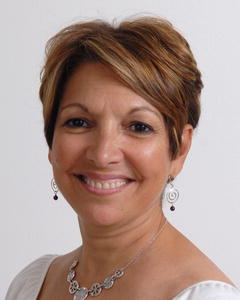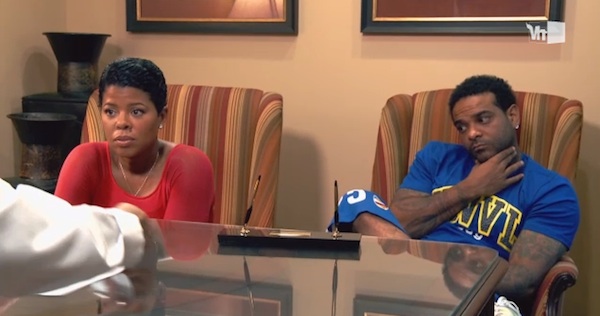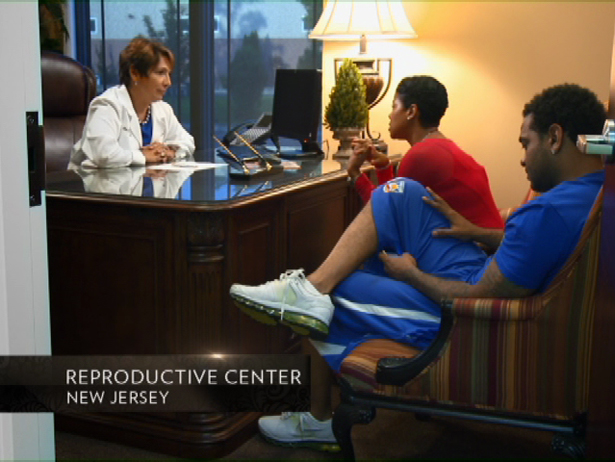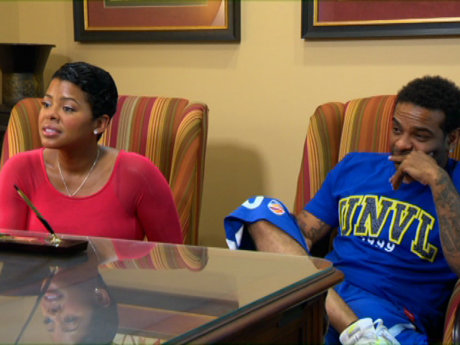If Dr. Althea O’Shaughnessy looks familiar to you it’s probably due to her guest appearance on last week’s episode of VH1’s “Chrissy & Mr. Jones” where she advised Chrissy Lampkin and Jim Jones on their fertility options. While contemplating whether to freeze her eggs or follow her fiancé’s insistence on starting a family immediately, Lampkin sought advice from Dr. O’Shaughnessy and aired some of their conversation on camera when the couple visited her Lawrenceville, New Jersey office a few months ago.
Prior to j oining the Reproductive Science Center of New Jersey in April, Dr. O’Shaughnessy had a successful private practice in reproductive endocrinology and infertility for over 17 years and became Medical Director of Princeton Center for Infertility & Reproductive Medicine. She obtained her medical degree from the University of Rochester School of Medicine and Dentistry and went on to do a residency in Obstetrics and Gynecology at The University of Connecticut School of Medicine and Dentistry. Throughout her stellar career, she has garnered numerous awards for patient care including Top Women’s Doctor of New Jersey 2009, Top Doctor in the Nation, 2010 and Top Doctor in New Jersey 2012. I spoke with Dr. O’Shaughnessy to learn a little bit about her role on the reality TV show and gain a lot more knowledge on her larger role as a leader in reproductive medicine.
oining the Reproductive Science Center of New Jersey in April, Dr. O’Shaughnessy had a successful private practice in reproductive endocrinology and infertility for over 17 years and became Medical Director of Princeton Center for Infertility & Reproductive Medicine. She obtained her medical degree from the University of Rochester School of Medicine and Dentistry and went on to do a residency in Obstetrics and Gynecology at The University of Connecticut School of Medicine and Dentistry. Throughout her stellar career, she has garnered numerous awards for patient care including Top Women’s Doctor of New Jersey 2009, Top Doctor in the Nation, 2010 and Top Doctor in New Jersey 2012. I spoke with Dr. O’Shaughnessy to learn a little bit about her role on the reality TV show and gain a lot more knowledge on her larger role as a leader in reproductive medicine.
Please give me an idea of your day-to-day activities. Do you work five days a week?
Well, it could be seven days a week. It’s five days a week for routine appointments. It’s a seven days a week practice because obviously if you are doing inseminations or if you are doing retrievals of oocytes that can occur on the weekend so I’m on call. On the weekends, I am at the Reproductive Science Center in Eatontown. That’s where their main office is. That’s where their IVF [in vitro fertilization] Center is. That’s where I do all my work including my inseminations and IVF procedures.
How did your appearance on “Chrissy & Mr. Jones” come about?
The major issue between Chrissy and Mr. Jones was her not wanting to have a baby right now. They contacted me to ask if I would be willing to sit down with her and discuss issues surrounding pregnancy in someone her age as well as freezing her eggs and putting off pregnancy. I told them I would be more than happy to sit down with them and do a consultation with them.
We don’t know Chrissy’s age but you told her that a large percentage of her eggs wouldn’t be good at this point. Please elaborate on that.
As women get older, the number of eggs that you have available to you and the quality of the eggs change and that’s variable from woman to woman. I didn’t do any kind of evaluation on her but this was an initial consultation. In general, if you look at pregnancy rates with IVF which kind of reflects that if you compare our pregnancy rates to women who are age 35 to 37 the pregnancy rates are like 57 percent. If you look at women age 38 to 40 that drops down to 29 percent so there’s a significant decrease in pregnancy rates again because of the fact that we are not getting as many eggs from them and the quality of the eggs are not as good. The eggs are chromosomally and genetically not normal so those either do not fertilize or if they fertilize they don’t grow normally or they don’t grow normally and they don’t implant. That just reflects what we call ovarian reserve which obviously changes as a woman gets older so a woman is born with a certain number of eggs and that’s it. It’s not like men where they are regenerated every three months. That’s why you have a biological time clock basically.
There are people in relationships right now who saw that episode and may be worried about whether they can have children. When should couples be concerned?
Well, that’s a very good question. I always tell women the sooner you can get pregnant the better. In terms of how we progress over the years, our biological clock has not changed in women. We are kind of pushing the envelope. A woman’s maximum fertility potential probably is in the teens and in her twenties. But obviously women don’t want to get pregnant in their teens and early twenties but once you start to hit mid-thirties that’s when you need to start thinking about a decline in fertility potential because not all women are the same. Most women can get pregnant in their mid-thirties and even into their late thirties, however, there is a subset of women where that is not easy because your biological clock is different. If you look at a bell curve they are on the far end of the bell curve in terms of their ovarian reserve and there’s no way to know that other than being tested and see what their fertility potential is and there are ways that we can do that. I think women should start thinking about becoming pregnant by the time they hit age 35 and of course there are other issues such as abnormal pregnancies and genetic abnormalities. That all goes up after age 35.
Please explain the process of freezing eggs that Chrissy was inquiring about.
Well, egg-freezing is a newer technology. The standard technology has been freezing embryos. That’s been around for a while and we know that pregnancy rates have been very good with frozen embryos. But now freezing eggs is a new technology and we’ve gotten better so what we are finding now is that with freezing eggs the pregnancy rates are almost comparable to freezing embryos. Eggs can be frozen for five years, however, the technology is new so we don’t really know how long eggs can remain frozen for. That’s a question mark. When patients sign consent forms we recommend not having eggs remain frozen for more than five years but that’s not based on sound research. In terms of the process, if a patient wants to freeze her eggs she has to undergo the same process as women who go through in vitro fertilization. Their ovaries have to be stimulated with fertility drugs. The eggs have to be extracted and that’s a minor surgical procedure and then, of course those eggs are then frozen.
 Jim Jones and Chrissy Lampkin listen intently as Dr. O’Shaughnessy discusses their fertility options.
Jim Jones and Chrissy Lampkin listen intently as Dr. O’Shaughnessy discusses their fertility options.
I am sure you hear so many misconceptions about fertility. Is there anything you want to clarify?
The myth is that I can get pregnant at 45. They see a lot of these actresses and all these people getting pregnant when they are older. What they don’t recognize is that some of these older women are using donor egg and of course, they don’t know that. I think that women are relying on these things and think they have time. But what they don’t realize that at that point it’s much more difficult to get pregnant and that’s the hardest thing when we see women already in their 40s there’s nothing you can do about that. You can be aggressive. You can tell them to go straight to in vitro fertilization but in terms of bettering their prognosis we can’t do that. It has to do with egg number and quality. I would say that’s the biggest misconception that’s out there. Freezing eggs is also the other issue. Unfortunately, when women come in and recognize that they want to freeze their eggs they are already 39 and 40. They say they don’t have a partner and they want to get pregnant and by then the egg quality is not there and the pregnancy rates are not going to be as good if they came in at a younger age, less than age 35 or less than age 37. That’s another big misconception.
Give us a basic understanding of all the services that your center provides for people who are contemplating their next move.
I see women for infertility so in infertility the services that we provide are ovulation and fertility drug therapy. We do all of the testing here in the office including ultrasounds and blood work. They don’t have to go somewhere else for that. Inseminations again are done here in this office. We do intrauterine inseminations, wash sperm, and we do semen analysis here. We provide IVF services and services for donor egg. We now utilize frozen donor eggs as well as fresh donors, women who are anonymous donors.
We also see patients who have reproductive endocrine problems such as abnormal bleeding and uterine fibroids. We provide robotic surgery. We do tubal reanastomosis for patients who don’t want to go through IVF who have had their tubes tied and again we do that robotically. We see patients with endometriosis and pelvic pain. Second to that, we see young adoloscents who have problems with their periods, irregular periods, painful periods or lack of periods. Finally, we see patients with polycystic ovarian syndrome which is another very common endocrine problem. We just don’t see infertility patients. We also see patients with hormone disorders related to reproduction.
Do you also evaluate male patients?
We do semen analysis and obviously if there is an abnormality with the semen analysis we will advise them as to what they need to do but we don’t actually treat men here so we do refer them to andrology specialists or urology specialists who see men with infertility because they are the people who will examine them and give them hormone therapy. They will do testicular aspirations if they need that. Although we do semen analysis we don’t follow the male patients here.
What’s the toughest part of your job?
I guess the biggest challenge nowadays is the older patient that’s trying to get pregnant because it’s very emotional for them. They feel that this is it and this is their only chance to get pregnant and there is very little we can do as physicians to help these women get pregnant because of the issue with ovarian reserve.
What advice do you give to those patients?
We offer them either adoption or a donor egg. With a donor egg right now the pregnancy rates are very good. It’s almost 60 percent which is excellent but unfortunately some women don’t want to pursue that because that’s something they have to be completely comfortable with, as well as their husband or partner. It’s also expensive and it’s not covered by insurance. It’s a lot of money they have to put down to be able to afford that kind of technology.
What’s the general estimate on that procedure?
It’s a wide variation. It can be anywhere from $15,000 up to $25,000.
What’s the legal process involved with the donor egg to protect the potential parent?
Legally, there is no precedent. Usually it’s anonymous. Patients can bring in a known donor. They can bring in family members who are willing to be egg donors. That’s not the most common. But it’s not the same as a surrogacy situation where you know the person or the gestational carrier where they are carrying the pregnancy. With a donor egg there is legal precedent. Donors can’t come back and say that’s my baby. It’s not as much of a concern.
What do you offer for patients who want twins?
Our society, the American Society for Reproductive Medicine, is really trying to decrease the multiple gestation rate. We want one healthy pregnancy. That’s our goal. Patients come in and say they really want twins and there’s no way to guarantee twins. Obviously if you increase the number of embryos you put in obviously you are going to increase the number of eggs you implant but you can’t say that I will put two embryos in and you are going to have twins. That doesn’t necessarily translate so our goal is to give you one healthy pregnancy. That’s the right thing to do because twins are a high-risk pregnancy.
Your company provides a free consultation by phone. Who does the patient speak with?
That’s me.
Do you accept insurance?
We take most insurance but not all insurances cover infertility so obviously when the patient calls to make an appointment we say we would like to check your benefits. They give us their insurance information. We call their insurance. We check all of their benefits so the patient will know how much is covered before they even come in for a consultation.
If they want to pay cash how much would that be?
I think it’s $350 for the initial consultation and that’s without any procedures. We do have special packages for patients who are self-pay and don’t have any insurance coverage.
For patients who want to read more about infertility and the work that you do, what resources do you recommend?
There’s one Web site. It’s called the American Society for Reproductive Medicine. That’s our society so there is a portion for patients. The other is Resolve, which is an organization started by infertility patients. It’s a great resource. The other is the American College of Obstetricians and Gynecologists. Those are the only ones that I can recommend. Stay away from blogs.
What was your reaction to seeing yourself on the show?
A lot of it was edited out. They tried to emphasize the conflict between the two of them and her wanting to freeze eggs. It’s kind of unrealistic. It’s not really what happens when I see patients. I spend an hour with our patients so it’s a very long consultation going over a lot of issues.
For more information on the Reproductive Science Center of New Jersey visit FertilityNJ.com or call (609) 895-1114.
RELATED ARTICLES:
VH1 PRESENTS CHRISSY & MR. JONES


